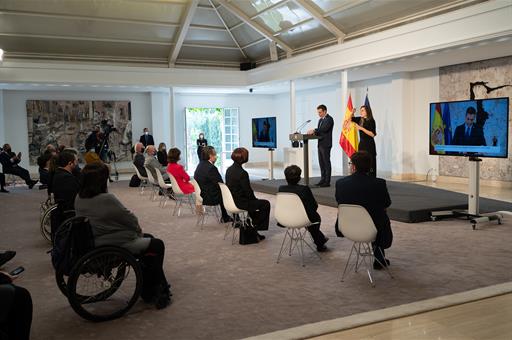Pedro Sánchez: "Reforming article 49 of the Constitution places our country at the forefront of disability policies"
President's News - 2021.5.13
Moncloa Palace, Madrid
During the presentation of the legislative initiative, the head of the Executive referred to the need for public and express recognition by institutions so that equality is effective and real, pointing out that "addressing disability is not only a question of social justice, it means being aware of our diverse reality and addressing it in all its extremes", because we will only achieve true social equality when we ensure "non-discrimination, equal opportunities for all" and "when we effectively bring inclusion to all areas: to education, health and employment".
Sánchez stressed that reforming article 49 of the Constitution of "great significance, befitting a social government, such as ours, and, above all, one that opens constitutional reform through the social door".
A reform of which, in his opinion, we should all feel proud, because it "places our country as one of the main benchmarks" in fundamental legislation in such a key area and "places us at the forefront in everything that disability policies represent".
Likewise, he made an express appeal to parliamentary political forces to approve the reform of article 49 unanimously in the Cortes and therefore be not only a triumph for this sector, but "for the country".
The head of the Executive highlighted the participation and collaboration of CERMI in the reform carried out by the Executive, which was approved last Tuesday in the Council of Ministers. Thanks to this amendment of structure, content and terminology, article 49 of the Constitution intensifies and advances the social protection of persons with disabilities at the highest regulatory level.
For her part, the First Vice-President of the Government, Ministry for the Presidency, Parliamentary Relations and Democratic Memory, Carmen Calvo, stressed that this reform not only means that a term that was an "affront" will disappear from the Constitution, but also "to consider that people with disabilities enjoy the same rights, the same freedoms and equal opportunities, in a society that includes them".
"We are making way for a gender perspective in the constitutional text, to protect women and girls in a particular manner given the difficulties of preserving some of their most important freedoms," the vice-president stressed, as a fundamental part of the reform of this article.
"We in the Government are proud of the speed with which the President of the Government wanted this reform carried out," said Carmen Calvo. "This is what is important, what the government does on a day-to-day basis. This is the response that a better Spain and a dignified Spain must give to almost 4 million fellow citizens", she concluded.
For his part, the president of CERMI, Luis Cayo, thanked the government for its determination in approving this reform, with which "we are making history", he said, while at the same time he expressed his pride that "it is disability that opens the door to a much more social state". "We are at the forefront of constitutional regulation in the world and it will pave the way for other countries," he said.
13 million Pfizer vaccines in June
During the event, Sánchez announced the arrival of 13 million vaccines from Pfizer during June, rising from 1.7 million per week from this company to 2.7 million.
This large batch of Pfizer vaccines, as announced by Pedro Sánchez, will ensure that 10 million people receive the full vaccination schedule during the first week of June, something that "takes us in a straight line towards herd immunity, i.e., 33 million Spaniards vaccinated by mid-August". "And we are going to do it, as we do things in this country, with humility, but with great determination and professionalism. So there are 97 days left before we finally achieve herd immunity.
Vaccination of persons with disabilities
The President of the Government also acknowledged the "historic effort" being made by all administrations to speed up the vaccination process as much as possible and highlighted people with disabilities as a priority group within the vaccination plan, a group that includes 4 million people and which has already begun to be vaccinated, starting with disabled people who are institutionalised and those who, although living in their own homes, have a grade 3 dependency.
We are aware of the urgency and importance vaccinating people with disabilities, especially for those with more specific characteristics," Pedro Sánchez said, recalling that, for this reason, on 11 May, the Public Health Commission agreed to prioritise vaccinations for people with severe disabilities, people with profound autism, learning disabilities and those with severe mental illness.
Advances in rights
During his speech, the head of the Executive recalled the advances for people with disabilities that have been achieved with this government, such as the recognition of the right to vote for people with learning disabilities; the recognition of the right to sexual and reproductive health for people with disabilities, with the law that prohibits forced or non-consensual sterilisation of people with disabilities who are judicially incapacitated, or in the legal autonomy and judicial protection of people with disabilities.
In this regard, he also announced Spain's firm commitment to present the Sustainable Development Strategy in the framework of the Voluntary National Review at the next UN High Level Forum on Sustainable Development in July.
Non official translation





